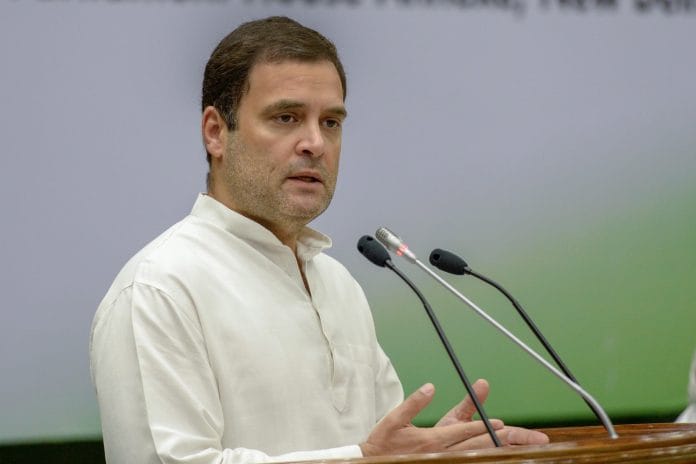Manmohan Singh and Rahul Gandhi have both done a flip-flop on the anti-Sikh riots.
Congress president Rahul Gandhi’s remarks in London on 1984 anti-Sikh riots once again highlight the party’s Catch-22 situation over a highly emotive and sensitive issue.
Interacting with parliamentarians in the UK last week, Rahul said, “I have no confusion in my mind about that… You say that the Congress party was involved in that, I don’t agree with that. Certainly there was violence, certainly there was tragedy.”
Rahul’s recent posturing on the issue is in stark contrast to his statement in January 2014, when he said some Congressmen were “probably involved” in the violence against Sikhs between 31 October and 3 November in 1984.
Also read: A bloody miscalculation called Blue Star
In a rapid fire session with news anchor Arnab Goswami, this is what Rahul, who was then the Congress vice-president, said:
Arnab: Were Congressmen involved?
Rahul: Did innocent people die? Absolutely.
Arnab: Were Congressmen involved?
Rahul: Some Congressmen were probably involved.
Arnab: Has justice been delivered to them?
Rahul: There is a legal process through which they have gone through.
Arnab: You admit some Congressmen were probably involved…
Rahul: Some Congressmen have been punished for it.
Manmohan Singh’s flip-flop
Rahul is not the only one in the Congress to have changed tack on the issue. In his 1999 Lok Sabha campaign for South Delhi constituency, Manmohan Singh tried implicating the Rashtriya Swayamsevak Sangh (RSS) for the 1984 riots.
He described the riots as a “black spot and the saddest event” while interacting with reporters at the Press Club of India on 2 September 1999. He, however, claimed the Congress as an organisation had no role in the riots. Rather, he pointed fingers at the RSS and said that the FIRs lodged at different police stations proved the involvement of several RSS men.
Manmohan, despite being a frontrunner, lost the fight to the BJP’s V.K. Malhotra. Infighting within the Congress and a strong BJP campaign, asking Sikh voters to not vote for a party that had “blood on its hands”, worked against Manmohan.
Within months of his electoral defeat, Manmohan started talking differently. The politician clarified that he had not held the RSS solely responsible for the 1984 riots.
In December 1999, Manmohan said, “My statement was twisted for electoral gains. I had said that if there were individuals associated with the Congress and other organisations, including the RSS, who had taken part in the riots, they should be punished.”
Years later when Manmohan, the prime minister, tendered an apology over 1984 killings in the Rajya Sabha on 11 August 2005, the RSS reference was nowhere.
Also read: On his death anniversary, remembering the most interesting man I’ve met: Bhindranwale
The PM instead said he was not standing on any ‘false prestige’ and bowed his head in shame. A somewhat emotional Manmohan recalled how he had accompanied Congress president Sonia Gandhi to Harminder Sahib a few years ago and the two prayed “to give us strength and show us the way that such things never again take place in our country”.
Rahul’s dilemma
Over a decade later, Rahul, Congress insiders say, can neither say the 1984 riots were a backlash nor is he in a position to bring the RSS in the picture. The RSS has already slapped a defamation case against Rahul over the Congress leader’s allegation that it was involved in Mahatma Gandhi’s assassination.
Privately, a section of Congressmen feel Rahul seems influenced by liberals and left intellectuals on sensitive matters like 1984 anti-Sikh riots else he could have showcased Manish Tiwari and Ajay Maken as victims of Punjab insurgency and post ’84 violence.
Tiwari’s father V.N. Tiwari, a professor and author of over 40 books, was gunned down by militants in Chandigarh in 1984 while Maken’s brother Lalit, parliamentarian and son-in-law of former president Shankar Dayal Sharma, was murdered in west Delhi in a daring attack on 31 July 1985.
RSS support for Gandhis
While there is a huge difference between state-sponsored violence and individual acts of killings, the deaths of Professor Tiwari, Lalit Maken and several others left a deep impact on the Hindu psyche.
I have documented in my book Ballot: Ten Episodes that Shaped India’s Democracy that the RSS was supporting then-PM Indira Gandhi’s efforts to tame separatism in Punjab during the early 1980s.
Veteran RSS ideologue Nanaji Deshmukh in an article, which was published in Hindi magazine ‘Pratipaksh’ on 25 November 1984, asked people to bless and cooperate with Rajiv Gandhi when general elections were less than a month away. [Page 31, Ballot: Ten Episodes that Shaped India’s Democracy, Hachette]
Also read: Congress was involved in 1984 anti-Sikh riots – I saw & reported it.
Nanaji Deshmukh had described Indira as someone who “ultimately did secure a permanent place at the doorstep of history as a great martyr”. “With her dynamism borne out of her fearlessness and dexterity, she was able to take the country forward like a colossus for over a decade… she alone had the ability to run the decadent political system of our corrupt and divided society.”
Punjab has witnessed many state and parliamentary polls since 1984. With a population roughly divided between 58 per cent Sikhs and 38 per cent Hindus, the state has seen Congress rule in 1992-97, 2007-2012 and 2017 till date.
If Punjab has shown a willingness to move ahead and vote on more current issues of development, jobs and drug menace, it is time the Congress stops being afraid of the 1984 question.
Rasheed Kidwai is an ORF visiting fellow, author and journalist. The views expressed here are his own.







Quite right. But role RSS /BJP cannot be brushed under carpet. RSS/BJP in grab of Congress workers or call their goons in attacking sikh community in 1984. It was God send opportunity for Sangh Pariwar.